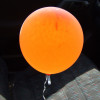在2个不同声音在火星上旅行ent speeds
Interview with
Just over a year ago, NASA’s Perseverance rover touched down on Mars. It’s equipped with some of the most powerful analytical equipment you can send into space and its mission is to look for evidence of life, past and possibly present. But it’s also got some older tech aboard, including a microphone, and periodically scientists have been eavesdropping on what Mars sounds like… which resulted in the rather strange discovery that, on Mars, sound travels at two different speeds, as Harry Lewis and public astronomer Matt Bothwell have been discussing…
Harry - So, we have a piece of sound that's come out from Perseverance, Matt, have you heard it before or shall I play it?
Matt - Why don't you give it a play?
Harry - Let's give it a play. (Audio clip) -It sounds like someone standing outside in a field on a rather windy day with not much else going on. It's very low frequencies that we are hearing there, isn't it?
Matt - That's right. Well, it sounds like someone's standing in a field recording in the wind because, in a way, that's what it is. It's wind on a different planet, but, at the end of the day, we're picking up a wind. You're right that we're hearing very low frequencies and that's one of the interesting things about audio on Mars: the Martian atmosphere is much thinner and made of different substances to the earth's atmosphere, and so sound will behave differently. Sound is a wave that travels through some kind of medium like air or water, and depending on what that medium, that can change the way the sound works. Think about when you inhale a helium balloon and then your voice goes all squeaky, that happens because the speed of sound in helium is much faster than the speed of sound in normal air.
Harry - I suppose that's the same with something like water, right? There's a speed difference between water and air.
Matt - Exactly, yeah. In physics, the speed of a wave is the frequency of the wave times the wavelength and the wavelength has to stay the same because that's set by the size of your vocal cords. So, if the speed increases, then the frequency has to go up as well, and so your voice sounds squeaky when you inhale helium. The opposite thing is true for Mars' atmosphere. It's a very thin carbon dioxide atmosphere and the sound is going to be very, very low. So, you get the opposite effect. The speed of sound is lower on Mars, and so you lose those high frequencies and everything sounds very low and booming. The surprising thing is that there's actually not one single speed of sound on Mars, it's actually two different speeds. To put it another way, the speed of sound on Mars varies depending on how high pitched the note is.
Matt - The reason is really interesting, actually. If you think about what sound actually is, it's a wave that carries energy through the air. If you imagine a wave washing through the air, you kind of imagine all the little air molecules bouncing into each other. That model works here on earth, but the Martian atmosphere is mostly carbon dioxide - these very little, rigid, springy molecules. As a wave travels through the Martian atmosphere, some of the energy of that wave goes into vibrating the little carbon dioxide molecules. Depending on the frequency of the wave, it's either going to travel as sound does on earth or it's going to lose some energy and so you get this double speed of sound effect.
Harry - The other thing that I noticed about this audio is that it's just wind. It's just the weather. There's nothing else really going on. It's quite a quiet place really, isn't it?
Matt - That's right. I think that, again, that's because Mars' atmosphere is so thin, it's actually pretty bad at transmitting sound. The rule is the denser your medium is the better it's going to transmit sounds. If you go in the opposite direction and think about water, much denser than air, and whales can communicate over thousands of miles in the oceans because they're talking through this dense medium, in Mars' thin atmosphere, you have the opposite problem. It would be very hard to have a conversation standing 10 meters apart because your voices would just get attenuated. Any distant sounds on Mars, like rocks moving around or whatever, just disappears into the thin air.




Comments
Add a comment